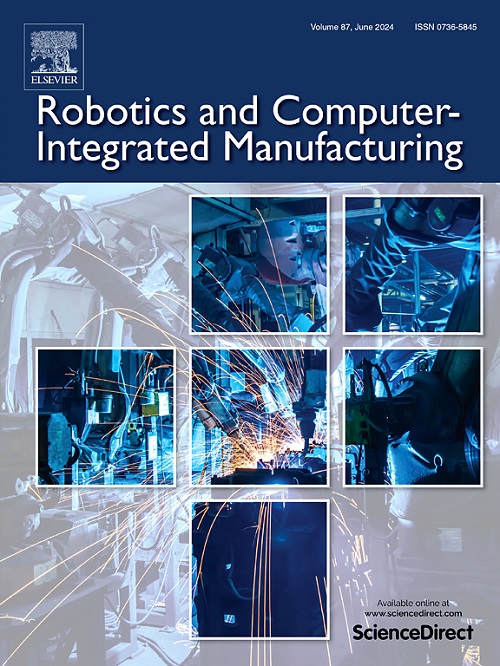Towards a trusted synchronized decision-making method for social production logistics systems based on blockchain and digital twin
IF 9.1
1区 计算机科学
Q1 COMPUTER SCIENCE, INTERDISCIPLINARY APPLICATIONS
引用次数: 0
Abstract
With the growth of personalized demands, manufacturers need to dynamically collaborate with external resources, forming social production logistics systems (SPLS). The complexity and dynamic nature of these systems increase management difficulty, rendering traditional static decision-making methods unsuitable. This study proposes a reliable dynamic collaborative control method for SPLS in discrete manufacturing environments. It aims to provide a secure and controllable collaborative platform for multiple participants, enhancing the system's resilience to disturbances in dynamic environments. A blockchain and digital twin-based trusted synchronized decision-making framework is designed, enabling real-time and reliable acquisition of comprehensive information to support efficient decision-making. Simultaneously, a blockchain smart contract tree-based trusted synchronized decision-making mechanism is proposed to address dynamic disturbances. Utilizing a collaborative optimization algorithm, the "production-distribution-warehousing" collaborative decision model is optimally coordinated to achieve efficient resource allocation and process management. Using the home appliance manufacturing industry chain as a case study, results show that the proposed trusted synchronized control method outperforms the non-trusted synchronized control method, resulting in a 35.3 % reduction in total system costs and an enhancement in the collaborative operational efficiency of the production logistics system, and ensures reliable and efficient system operation in a dynamic demand environment. This research provides valuable references for the operational management of future production logistics systems.
基于区块链和数字孪生的社会化生产物流系统可信同步决策方法研究
随着个性化需求的增长,制造商需要与外部资源进行动态协作,形成社会化生产物流系统(SPLS)。这些系统的复杂性和动态性增加了管理难度,使得传统的静态决策方法不适合。针对离散制造环境下的SPLS,提出了一种可靠的动态协同控制方法。它旨在为多个参与者提供一个安全可控的协作平台,增强系统在动态环境中对干扰的恢复能力。设计了基于区块链和数字孪生的可信同步决策框架,能够实时可靠地获取全面信息,支持高效决策。同时,提出了一种基于区块链智能合约树的可信同步决策机制来解决动态干扰问题。利用协同优化算法,对“生产-配送-仓储”协同决策模型进行优化协调,实现高效的资源配置和流程管理。以家电制造产业链为例,结果表明,所提出的可信同步控制方法优于非可信同步控制方法,使系统总成本降低35.3%,提高了生产物流系统的协同运行效率,确保了系统在动态需求环境下的可靠高效运行。本研究为未来生产物流系统的运行管理提供了有价值的参考。
本文章由计算机程序翻译,如有差异,请以英文原文为准。
求助全文
约1分钟内获得全文
求助全文
来源期刊
CiteScore
24.10
自引率
13.50%
发文量
160
审稿时长
50 days
期刊介绍:
The journal, Robotics and Computer-Integrated Manufacturing, focuses on sharing research applications that contribute to the development of new or enhanced robotics, manufacturing technologies, and innovative manufacturing strategies that are relevant to industry. Papers that combine theory and experimental validation are preferred, while review papers on current robotics and manufacturing issues are also considered. However, papers on traditional machining processes, modeling and simulation, supply chain management, and resource optimization are generally not within the scope of the journal, as there are more appropriate journals for these topics. Similarly, papers that are overly theoretical or mathematical will be directed to other suitable journals. The journal welcomes original papers in areas such as industrial robotics, human-robot collaboration in manufacturing, cloud-based manufacturing, cyber-physical production systems, big data analytics in manufacturing, smart mechatronics, machine learning, adaptive and sustainable manufacturing, and other fields involving unique manufacturing technologies.

 求助内容:
求助内容: 应助结果提醒方式:
应助结果提醒方式:


